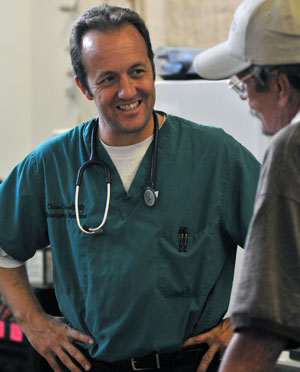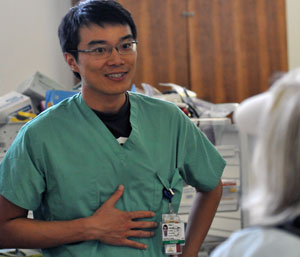Students Offer Guest Guidance, Cough Drops
By Tonia Twichell
 (November 2012) The first guest of the evening is a thin middle-aged man wearing a torn white T-shirt who greets
(November 2012) The first guest of the evening is a thin middle-aged man wearing a torn white T-shirt who greets
By the time he leaves a few minutes later, he’s asked about adding fiber to his diet (“Fruits and vegetables? No, man, it’s got to be quick”), gotten advice on foot calluses (“I tried wrapping them in duct tape but it didn’t work”) and is offered cream for a problem he’s whispered into Dr. Christopher Colwell’s ear (Don’t be embarrassed, Colwell counsels, “We see it all the time”)
He’s also the founder of the health care portion of the center and greets all comers with an easy, upbeat manner. “How ya doing?” he shouts to those hovering at the threshold, waving them into the room
“She said handing out food is wonderful, but ‘We have plenty of people to do that.’”
At
 “They simply want to check in because we know them and know the state of their health,” says Eric Brown, a fourth-year student who estimated that they recommend someone go directly to Denver Health about every two weeks for a serious condition.
“They simply want to check in because we know them and know the state of their health,” says Eric Brown, a fourth-year student who estimated that they recommend someone go directly to Denver Health about every two weeks for a serious condition.
Through donations and a small grant, the group fills a large vertical cart with bins of medicines labeled Skin, Feet, Dental, Musculoskeletal, etc
“When you work for a preceptor you’re in and out in 10 minutes; you don’t get to talk to the patient about their life,” Brown says. “You can’t ask things like ‘Are you taking vitamins, eating vegetables?’”
Many guests hang around to talk. One man tells the students about meeting his father for the first time, while a woman talks to Cheung about male menopause. Another man shows scars from stabbings and a run-in with a train.
“Some don’t have much opportunity for conversation the rest of the week,” Colwell says. “Many of the same ones come in week in and week out. We let them talk, and that might do as much good as helping them with their medical problems.”